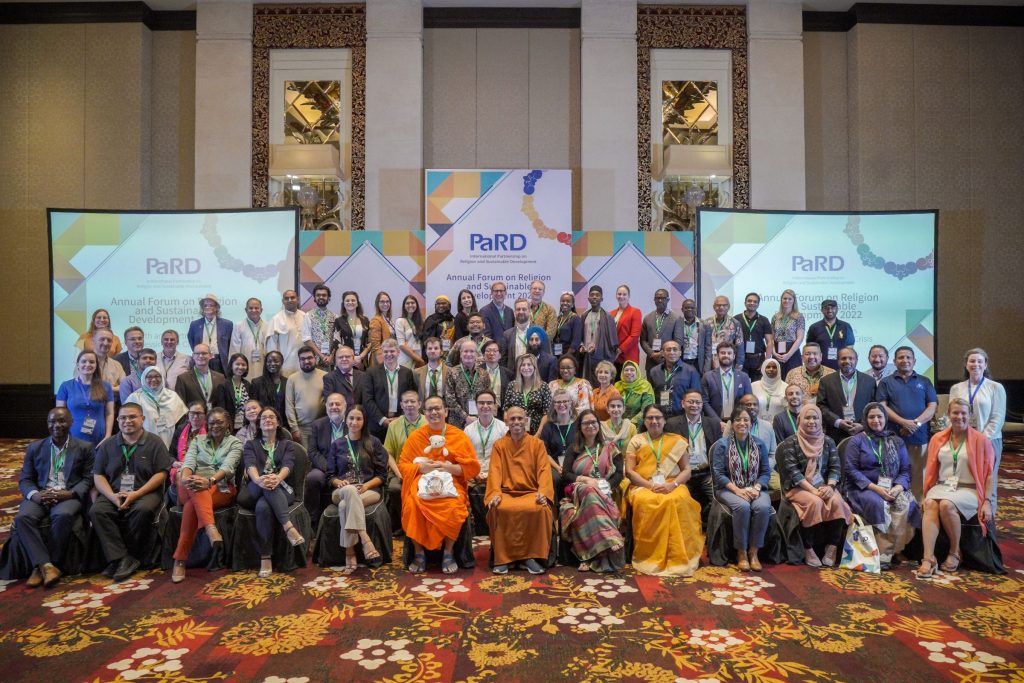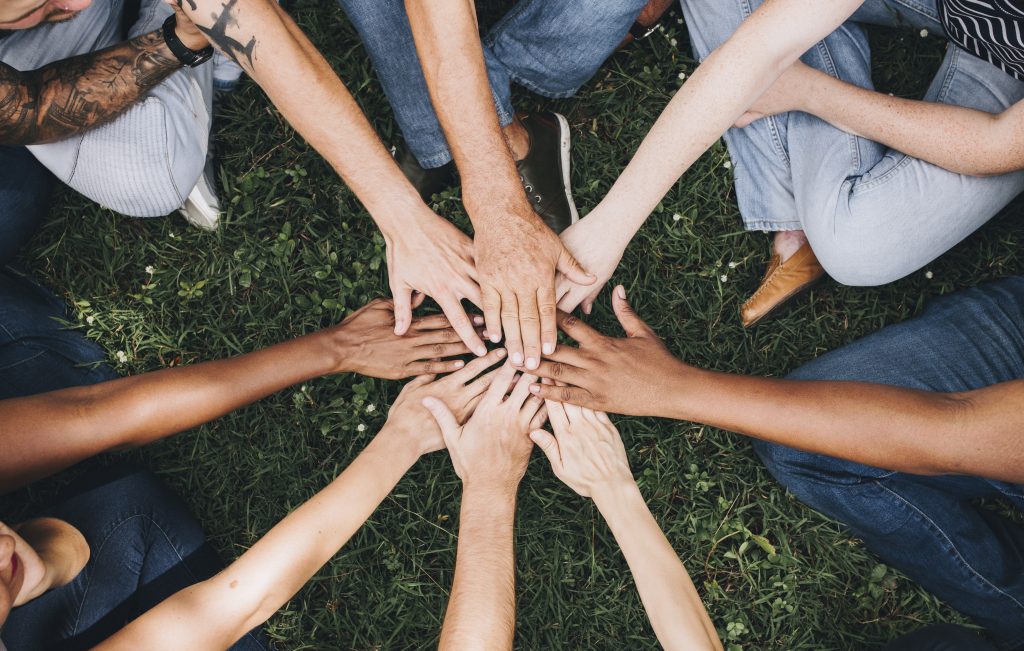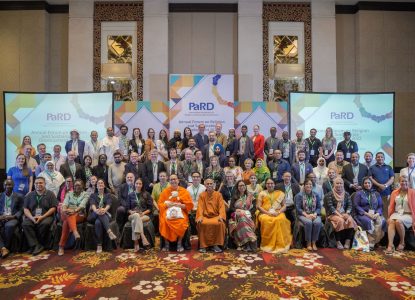By Khushwant Singh, Head of PaRD Secretariat
– – –
The International Partnership on Religion and Sustainable Development (PaRD) brings religious and other civil society actors together with governments, multilaterals, and academia to address pressing global challenges.
Polycrises demand collaboration. Accordingly, multistakeholder partnerships have gained attention in global affairs since the World Summit on Sustainable Development in South Africa in 2002. The 17th Sustainable Development Goal (SDG) of the 2030 Agenda of the United Nations, “Partnerships for the Goals”, explicitly highlights the need to strengthen partnerships to ensure that no one is left behind. This includes more systematic and long-term collaboration with religious actors.
Secularization has been dominating political discourses in many countries. The underlying paradigm assumes that religion becomes less significant in so-called developed societies. However, recent surveys demonstrate that four out of five people worldwide affiliate themselves with a religion (Pew Research Center 2022; Ipsos 2023; PaRD 2024). Also, in countries which progressed decisively economically in the last decades like the United Arab Emirates, India, and Indonesia, most of the population still affiliates to a religion.
Religion matters!
All over the world actors who represent or associate with religion play an influential role. In some cases, they are the cause of injustice, suffering, and violence, thus discrediting religion per se. In many other cases religious actors serve as catalysts for much needed transformation, contributing to humanitarian relief, peace, justice, protection of human rights and a sustainable lifestyle.
The International Partnership on Religion and Sustainable Development (PaRD) taps into the positive potential of religious actors. It brings religious and interfaith organizations together with other civil society actors, governments, multilaterals, and academia on a long-term basis to amplify contributions to the Sustainable Development Goals (SDGs) and make them visible at a global level.
PaRD was established in 2016 with a handful of members. It arose out of the conviction that it is crucial to embrace the positive potential that the world’s spiritual, religious, faith, and Indigenous communities hold to meet the targets outlined in the 2030 Agenda.
Today, PaRD has grown into an alliance with over 170 members. The German Federal Ministry for Economic Cooperation and Development (BMZ) has been the main funder of this partnership while other members have been supportive with substantial in-kind contributions. The partnership facilitates various workstreams and taskforces and offers a safe space that provides continuity for global dialogue, learning, sharing of good practices and evidence, and collaboration to better inform policy and practices through recommendations and practitioners guidelines.

Where arguments count more than money
We live in a world, where often the opinions and interests of those are followed, who bring the highest amount of money or influence on the table instead of considering the most holistic, wise, and far-sighted proposals. This is not only recurrently the case but there is also little consideration on how the money that shapes or even buys decisions was earned. A wise and ethical policy and business deal always pays attention to possible side-effects and the long-term ramifications on Mother Earth, fellow human beings and animals. Gurmat, timeless spiritual wisdom, which is at the heart of Sikhi, reminds us of this repeatedly:
ਜਿਤੁ ਕੀਤਾ ਪਾਈਐ ਆਪਣਾ ਸਾ ਘਾਲ ਬੁਰੀ ਕਿਉ ਘਾਲੀਐ ॥ ਮੰਦਾ ਮੂਲਿ ਨ ਕੀਚਈ ਦੇ ਲੰਮੀ ਨਦਰਿ ਨਿਹਾਲੀਐ ॥ Guru Grath Sahib, 474, M.2
PaRD is an example where members consciously try to establish a genuine and inclusive collaboration at eye-level. Neither the main funders dictate the agenda nor an individual. Instead, the Steering Board members, where all the key constituencies are represented, foremost religious organizations, and the leads of the Workstreams and Taskforces, come together and reach a consensus on strategic and operational issues. Following the most compelling argument instead of the preferences of those with money is crucial to PaRD’s vision and mission. Fred Nyabera, the director of the End Child Poverty initiative at Arigatou and a PaRD’s Steering Board member, testifies in a booklet on Global Voices on PaRD that “international inclusivity lies at the core of our partnership. Prioritizing our overarching goal over individual interests defines our unique approach. It’s worth noting that key funders don’t dictate our agenda; it’s the engaged leadership members who guide us.”
PaRD harnesses the positive roles that religious actors play globally and locally in achieving the SDGs through Workstreams on Food Security (SDG 2), Health (SDG 3), Gender Equality and Empowerment (SDG 5), Environment, Water and Climate Action (SDGs 6, 13, 14, 15), and Sustaining Peace (SDG 16). The partnership also works toward securing a fundamental principle of human rights and a precondition for sustainable development: Freedom of Religion and Belief (FoRB). Furthermore, PaRD facilitates discussions on topics such as localization and emerging issues such as artificial intelligence (AI) or online safety in an increasingly digital world with raising incidents of fake news and hate speech. With over 120 faith organizations from different religious traditions in over 40 countries, PaRD exemplifies inclusivity while drawing on a wide range of expertise from different perspectives and sectors.
The values and multifaceted responsibilities of religious actors
It is a key responsibility of spiritual, religious and faith leaders and actors to commit to respectful dialogue, inclusivity and human rights, and work together with their respective local communities to contribute to a more compassionate, peaceful, and just world and sustainable lifestyle.
Spirituality provides a source of trust, hope, and resilience especially during existential personal experiences, for instance when mental and physical abuse and violence is faced but also during natural disasters and humanitarian crisis. It also inspires people to volunteerism and selfless service, also in remote areas where state agencies and market driven actors reach their limits.
Frank Schwabe, the German Federal Government Commissioner for Freedom of Religion or Belief affirms the crucial role of religion in the development context: “In many cases faith organizations, religious actors and dignitaries fill important gaps in education, health but also support tirelessly in humanitarian crises.”
Religious, spiritual, and Indigenous leaders have a special responsibility to draw on values and wisdom that inspire the thoughts and actions of followers in such a way that they may lead a more conscious and humble life and be in more harmony with themselves and nature. They also play an important role to foster these values in faith organizations who are working on addressing concrete problems on the ground, also in relation to sustainable development.
As is evident form the contributions of the book “Voices from Religions on Sustainable Development”, the SDGs align with core values of religion: to ensure a life in dignity, respect and protect Mother Earth, and strengthen peace and well-being for everyone.
Achievements of religious actors to peace, health, environment, and climate protection
Peacebuilding, health, and environmental and climate protection are areas which exemplify how religious actors have been using their moral authority, resources, and networks in a positive way (an overview of contributions by religious actors to the SDGs you find here).
The peace agreement of 2016 between the FARC guerrilla group and the Colombian government was mediated with the support of faith actors. After years of civil war in the Central African Republic, dialogue facilitated by Muslims and Christians groups contributed to the 2019 peace agreement. The peace initiative 2021 in South Sudan was led by the lay community Sant’Egidio, a long-standing PaRD member.
In the field of health, the COVID-19 pandemic demonstrated how volunteers, particularly from religious organizations, including minorities, took on high risks to support people in need, also beyond their own communities. Public vaccination in the presence of monks, imams, pastors, and other religious authorities encouraged hesitant followers to consider a vaccination. Religious actors were also active in countering fake news and conspiracy theories related to vaccinations by correcting misinterpretations of religious texts. They also offered spiritual care via smartphones and social media. Volunteers inspired by their religion provided hands-on support by procuring oxygen and masks. One vivid example is the engagement of Sikhs from UK, who chartered flights and brought much-needed items to mega cities such as Delhi and rural areas of Panjab.
Justine Aenishaenslin of World Vision, one of the Leads of PaRD’s Health Workstream, notes that faith actors are crucial stakeholders since addressing sensitive subjects like health “hinges on partnering with faith institutions and leaders. They occupy an indispensable role in fostering values and shaping social norms due to their influential social and political standing.” On the basis of such an inclusive approach, practitioners, policymakers and academics came together through PaRD and developed a policy brief on how to provide faith-sensitive mental health and psychological support.
With other partners such as the Faith for Earth Coalition of UNEP, PaRD facilitated sessions at the UN Climate Conference COP28. At the first Faith Pavilion, over 300 speakers from all over the world gathered and highlighted contributions of religious, faith and Indigenous actors to climate action. They advocated for transformative paradigm shifts by fostering cyclic thinking, and evoking virtues and wisdom that are much needed to safeguard the well-being of all sentient beings and protecting nature and the whole of Mother Earth. Values such as humbleness, honesty, far-sightedness, inclusivity, and altruism – values that need to be cultivated especially amongst key decision makers in politics and business.
In this way, PaRD, without neglecting the misuse of religion for egoistic, political, and economic purposes, contributes to raising the global visibility of positive contributions of religious actors and encourages stakeholders to proactively seek collaboration with them to advance the 2030 Agenda.
“A promising vision for this partnership is to evolve into a comprehensive network of networks. PaRD assembles a diverse array of actors on a long-term basis, weaving a unique tapestry of discussions that significantly enrich the broader development and international cooperation landscape” observes Professor Katherine Marshall, Executive Director of the World Faiths Development Dialogue (WFDD), senior fellow at Berkley Center for Religion, Peace, and World Affairs, Georgetown University, and Vice President of IF20.

Epilogue
In a multipolar world, at a time when numerous crises are rapidly unfolding and suffering increasing, collaboration between religious and secular actors becomes even more crucial. Underpinned by the common values that are at the heart of spirituality, it is a key responsibility of religious, faith and Indigenous actors and decision makers to foster much needed paradigm shifts away from linear to circular models, and unite across regions, nations, traditions, cultures, and languages to make meaningful progress toward sustainable development and protect the Earth – our common home while being guests on this wonderful blue planet.
Background on the 2024 G20 Interfaith and PaRD Annual Forum on Religion and Sustainable Development in Brasilia
IF20 and PaRD have long standing experiences at the nexus of religion and development. Under the theme “Leave No One Behind: The Well-Being of the Planet and Its People”, the joint event will bring together a diverse array of stakeholders, including from various religious, faith and Indigenous traditions and other civil society organizations, representatives from governments, multilateral entities, academia, and developmental experts to share wisdom and insights from their work in meeting the SDGs. Held in Brasilia from 19th to 22nd of August 2024, the agenda for this gathering has been inspired by this year’s G20 theme: “Building a just world and a sustainable planet.”
Fostering inclusive dialogues that confront flagging trust, rising polarization, hate speech and violence, the Annual Forum retains a view toward strengthening long-term collaborations and supporting collective action. When faced with challenges such as poverty, violence, forced migration, and climate change – which heavily impact the world’s most vulnerable groups, including children – everyone is advised to work together to stem the tide.
Accordingly, the Annual Forum will be moving from aspirational to concrete action to deepen existing relationships and forge new partnerships in service of three goals: 1) to fight hunger, poverty, and inequality; 2) to address the three dimensions of sustainable development (economic, social, and environmental); 3) and to consider global governance reforms. Drawing on the contributions to the SDGs that religious and Indigenous actors have made across the world, the conference will create space to share good practices, multifaceted ideas, and recommendations, and harness the transformative potential of religion. In advancing global sustainable development agendas, the forum will serve as a catalyst for policy change through advocacy efforts that build on a wealth of experience at the local, national, and international levels. The conference will especially enable creating links with working groups such as the G20 Engagement Group and those on the G20 Sherpa Track.
– – –
Khushwant Singh was born in Panjab and grew up in Germany. He studied ethnology, education and social anthropology, and completed his Master’s degree at the University of Heidelberg and his Masters of Research at Goldsmiths College at the University of London, both with distinction. Singh has worked as a social worker with migrants and unaccompanied refugee minors. Since 2006, he has been working in international development cooperation on migration, diaspora cooperation, trade barriers, digitalization, and religion. Singh is the Head of Secretariat of the International Partnership on Religion and Sustainable Development (PaRD). He is a founding member of the Council of Religions Frankfurt, which he chaired on a voluntary basis from 2014 to 2017. Singh is also engaged in various initiatives, including the SikhiCouncil, and cooperates i.a. with the Global Ethic Foundation and the Foundation against Racism. Singh publishes and speaks on Sikhi/Gurmat, spirituality, ethics, behavioral change, sustainability, global challenges facing humanity, and offers workshops and podcasts for young people.
Selected publications
Singh, Khushwant. (2023). Sikhi’s Wisdom, Ethics and (De)Radicalisation: Decolonizing the Mind through Disidentification and Circular Thinking. In Ignace Haaz, Jakob Bühlmann Quero, & Khushwant Singh (Eds.), Ethics and Overcoming Odious Passions: Mitigating Radicalisation and Extremism through Shared Human Values in Education (pp. 243-259). Globethics.
Singh, Khushwant. (2018). Gurmat – The Art of Spiritual Wisdom. How Peace from Mind through Knowledge of the Soul can Help Overcoming the Challenges of Humankind. In James Walters (Ed.), Religious Imaginations (pp. 218-233). Gingko Press.


